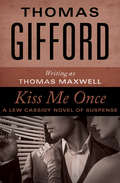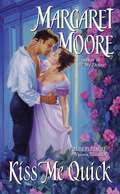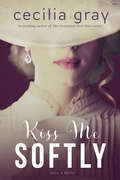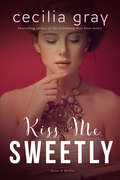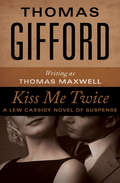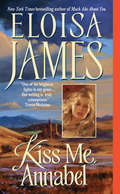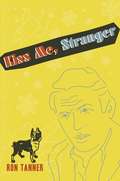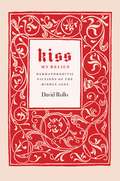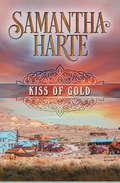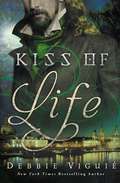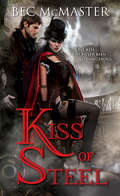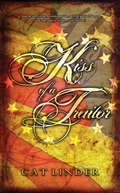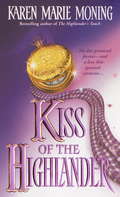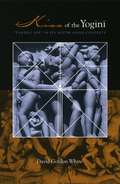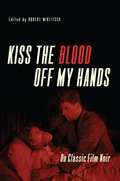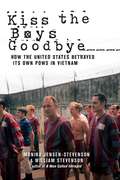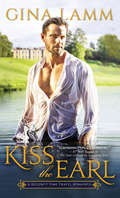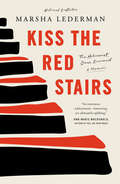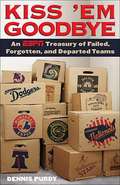- Table View
- List View
Kiss Me Once (The Lew Cassidy Novels #1)
by Thomas GiffordAt the start of World War II, a football star fights gangsters on the home frontBrooklyn Bulldogs star defensive end Lew Cassidy is on his way to a touchdown when a nasty tackle snaps his leg and ends his career. When he wakes up in the hospital, he learns the Japanese have attacked Pearl Harbor, and America is at war. It&’s a shame his busted leg will keep him out of the army, because compared to New York, war is kindergarten. Cassidy&’s closest friend is Terry Leary, a homicide detective who&’s too slick for his own good. Just a few hours after Cassidy&’s injury, someone puts a bullet in Leary&’s spine. Cassidy leaves the hospital ready to avenge his friend—a fight that pits him against a gang of crooks who make him yearn for the comparative peace and safety of the gridiron.
Kiss Me Once (The Lew Cassidy Novels #1)
by Thomas GiffordAt the start of World War II, a football star fights gangsters on the home frontBrooklyn Bulldogs star defensive end Lew Cassidy is on his way to a touchdown when a nasty tackle snaps his leg and ends his career. When he wakes up in the hospital, he learns the Japanese have attacked Pearl Harbor, and America is at war. It&’s a shame his busted leg will keep him out of the army, because compared to New York, war is kindergarten. Cassidy&’s closest friend is Terry Leary, a homicide detective who&’s too slick for his own good. Just a few hours after Cassidy&’s injury, someone puts a bullet in Leary&’s spine. Cassidy leaves the hospital ready to avenge his friend—a fight that pits him against a gang of crooks who make him yearn for the comparative peace and safety of the gridiron.
Kiss Me Quick
by Margaret MooreLady Diana Westover is looking for a hero. She intends to write a gothic novel, but having grown up shielded from the ways of the ton, she knows nothing about men. What better way than to explore the ballrooms of Society? During her first outing, she sees Edmond Terrington, Viscount Adderley. With his dark handsome looks, he is exactly the man she's been looking for. So Diana sets out to follow his every move, to study his manly form, and to experience the pleasure of his kisses . . . all for the sake of research. Edmond cannot imagine why this chit would be following him, spying on his every move, and looking at him as if he is a fascinating bug in a science experiment. He's used to admiring females, but this is ridiculous! So he decides to turn the tables and pursue her instead . . . only to find that she is a disarming beauty whose wit matches his own. Soon all he wants is to be the hero of her dreams.
Kiss Me Softly
by Cecilia GrayA brand new series from the author of The Gentlemen Next Door, praised for being a "delightful Regency romp… in the spirit of Georgette Heyer."Meet Seraphina Belle—the Belle Belle—whose face has launched a legion of metaphorical ships. Since her birth caused her mother's death, she's determined to be the perfect daughter. As a dowager duchess at the height of respectability, she is known for turning out perfect matches… until he threatens to ruin her perfect reputation.* * *ABOUT THE KISS A BELLE SERIESFive supportive sisters.Five friendly gentlemen.Five stolen kisses.Everyone has kissed someone, but who has kissed whom?Secrets of the past will become very much present as arrangements are made and proposals fly in this charming, Regency-style series. While all of the stories can be enjoyed as standalones, you may want to read them all. Books 1–3 occur concurrently and can be read in any order; Books 4 and 5 follow respectively.Book 1: Kiss Me AfterBook 2: Kiss Me DarklyBook 3: Kiss Me SweetlyBook 4: Kiss Me SoftlyBook 5: Kiss Me Again
Kiss Me Sweetly
by Cecilia GrayA brand new series from the author of The Gentlemen Next Door, praised for being a "delightful Regency romp… in the spirit of Georgette Heyer."Meet Bridget Belle—the Bookish Belle—her head full of mischief and ideas. Unlike her sisters, she has every intention of marrying a storybook hero. Someone romantic and passionate—just like her.Meet Benjamin Abernathy—the sensible duke's son—his head firmly on his shoulders. Being the rational one amongst his friends has seen him through school and the war. But it will take more than reason and logic to win a battle of wits against Bridget.* * *ABOUT THE KISS A BELLE SERIESFive supportive sisters.Five friendly gentlemen.Five stolen kisses.Everyone has kissed someone, but who has kissed whom?Secrets of the past will become very much present as arrangements are made and proposals fly in this charming, Regency-style series. While all of the stories can be enjoyed as standalones, you may want to read them all. Books 1–3 occur concurrently and can be read in any order; Books 4 and 5 follow respectively.Book 1: Kiss Me AfterBook 2: Kiss Me DarklyBook 3: Kiss Me SweetlyBook 4: Kiss Me SoftlyBook 5: Kiss Me Again
Kiss Me Twice (The Lew Cassidy Novels #2)
by Thomas GiffordA mad Nazi plot gives Cassidy a chance to save his estranged wife--or lose her forever As the dust settles on World War II, detective Lew Cassidy's wife has come back from the dead. A German figure skater with a film-star face, she had returned to her home country when the war began to care for her ailing father; Cassidy later heard she died during an Allied bombing raid. But in the weeks after the German surrender, the US Army finds her in Bavaria, stricken with amnesia and married to Manfred Muller, an SS swashbuckler at the top of the army's most-wanted list. In the war's last days, Muller escaped Germany with a historic golden minotaur sculpture, planning to sell the statue and use the proceeds to establish a Nazi underground in the United States. When Muller disappears in the wilds of Maine, the army gives Cassidy a chance to serve his country. To catch the Nazi, he'll use his wife as bait, and hope he doesn't lose her a second time.
Kiss Me at Christmas: Playful Brides (Playful Brides #10)
by Valerie BowmanBow Street Runner Daffin Oakleaf abhors Christmas. Carol singing and holiday cheer only remind him of a dark time. When a close friend calls on him for help, Daffin is happy to capitalize on the distraction. But when he learns the lovely Lady Regina is the one in danger, he’s to become bodyguard to the captivating woman... <p><p> Regina has one mission: to find a night of passion in the arms of a gentleman. Considered firmly on the shelf, Regina has given up on marriage—but that doesn’t mean she wants to be denied the pleasure married ladies experience. Daffin has long captured her attention…and when a threat calls him to her side, the sparks between them ignite. But how can a hired bodyguard find his way into Regina’s noble heart?
Kiss Me, Annabel
by Eloisa JamesThe rules of marriage . . . according to Miss Annabel EssexA husband must be:Rich.Make that very rich. She's had enough of leaky roofs and thread-worn clothing.English.London is the center of the civilized world, and Annabel has a passion for silk and hot water.Amiable.Good-looking would be nice, but not necessary. Same for intelligent.Isn't she lucky? She's found just the man! And her chosen spouse is nothing like the impoverished Scottish Earl of Ardmore, who has nothing but his gorgeous eyes, his brain--and his kisses--to recommend him.So what cruel twist of fate put her in a carriage on her way to Scotland with just that impoverished earl and all the world thinking they're man and wife? Sleeping in the same bed? Not to mention the game of words started by the earl--in which the prize is a kiss. And the forfeit . . . Well. They are almost married, after all!
Kiss Me, Stranger
by Ron TannerSet in an unnamed country sometime in the past, present, or future, Kiss Me, Stranger is the story of one woman's attempts to keep her family together while a civil war rages around her.Penelope, her husband and her fourteen children live in a small war-torn country built atop a landfill. After her husband and eldest son are drafted by opposing factions in the war, Penelope and her remaining children, desolate and nearly starving, are forced to scavenge for scrap--comprised of discarded consumer goods such as computers, televisions and automobiles--in the bombed-out city. When the government scrap collector makes an unreasonable demand in already unreasonable circumstances, Penelope slaps him across the face, leading to her arrest. Her subsequent escape sends her family on a journey literally into the heart of the landfill, where they come face to face with the stupidity, destruction and at times, dark humor, of war and modern consumer society.Featuring over fifty illustrations by the author, Kiss Me, Stranger is a comical and tragic commentary on war, violence, and consumerism.
Kiss My Relics: Hermaphroditic Fictions Of The Middle Ages
by David RolloConservative thinkers of the early Middle Ages conceived of sensual gratification as a demonic snare contrived to debase the higher faculties of humanity, and they identified pagan writing as one of the primary conduits of decadence. Two aspects of the pagan legacy were treated with particular distrust: fiction, conceived as a devious contrivance that falsified God's order; and rhetorical opulence, viewed as a vain extravagance. Writing that offered these dangerous allurements came to be known as "hermaphroditic" and, by the later Middle Ages, to be equated with homosexuality. At the margins of these developments, however, some authors began to validate fiction as a medium for truth and a source of legitimate enjoyment, while others began to explore and defend the pleasures of opulent rhetoric. Here David Rollo examines two such texts--Alain de Lille's De planctu Naturae and Guillaume de Lorris and Jean de Meun's Roman de la Rose--arguing that their authors, in acknowledging the liberating potential of their irregular written orientations, brought about a nuanced reappraisal of homosexuality. Rollo concludes with a consideration of the influence of the latter on Chaucer's Pardoner's Prologue and Tale.
Kiss My Relics: Hermaphroditic Fictions of the Middle Ages
by David RolloConservative thinkers of the early Middle Ages conceived of sensual gratification as a demonic snare contrived to debase the higher faculties of humanity, and they identified pagan writing as one of the primary conduits of decadence. Two aspects of the pagan legacy were treated with particular distrust: fiction, conceived as a devious contrivance that falsified God’s order; and rhetorical opulence, viewed as a vain extravagance. Writing that offered these dangerous allurements came to be known as “hermaphroditic” and, by the later Middle Ages, to be equated with homosexuality. At the margins of these developments, however, some authors began to validate fiction as a medium for truth and a source of legitimate enjoyment, while others began to explore and defend the pleasures of opulent rhetoric. Here David Rollo examines two such texts—Alain de Lille’s De planctu Naturae and Guillaume de Lorris and Jean de Meun’s Roman de la Rose—arguing that their authors, in acknowledging the liberating potential of their irregular written orientations, brought about a nuanced reappraisal of homosexuality. Rollo concludes with a consideration of the influence of the latter on Chaucer’s Pardoner’s Prologue and Tale.
Kiss Of The Night Wind (Zebra Historical Romance Ser.)
by Janelle TaylorLeaving her brother's outlaw gang, Carrie Sue Stover starts a new life as Carolyn Starns, schoolteacher, but an attack on the stagecoach she is riding brings her right back into the world of outlaws.
Kiss The Girls Goodbye
by Lilian HarrySet in a Lyon's Corner House in London, this is the second novel in the series set against the backdrop of the Second World War which began with CORNER HOUSE GIRLS.'The Corner House was making a good job of New Year's Eve, despite the bad weather, the blackout, the looming threat of rationing...The Nippies were dashing to and fro with their big silver trays and the war seemed suddenly far away.' So begins 1940 for the Nippies at the Lyons Corner House at Marble Arch. But despite putting on a cheerful face for the customers, the war is taking its toll on all the waitresses: for Maggie, married just a few hours and then parted from her husband; for Jo and Phyl, anxiously waiting for news from their fiancés; for Etty, and the constant jibes she faces about her background; and even for Irene, who begins a new friendship which is not all it appears to be...
Kiss of Gold
by Samantha HarteA young Englishwoman goes searching for her father in America, only to find love and adventure on the Colorado frontier in this historical romance. England, 1893. In order to maintain her family&’s elegant Bethinghamshire home, Daisie Browning faces the unhappy prospect of marrying for money—until she resolves to seek out her lost father in America. Traversing the Atlantic and the country&’s wild terrain, Daisie is prepared for adventure and danger. But the last thing she expects to find on her journey is love. When she finds herself stranded, robbed, and beset by swindlers in an isolated Colorado mining town, Daisie reluctantly accepts the help of the handsome and rakish Tyler Reede. Though she resists his advances, Daisie cannot help being drawn to Tyler—especially when she discovers that everything she truly wants can be found in his passionate embrace.
Kiss of Life: A Kiss Trilogy Short Story (The Kiss Trilogy #2)
by Debbie ViguieThe Baron has lived for hundreds of years, a vampire who makes the most of his immortal life. Having personally learned the value of freedom, he has lately been using his exceptional fighting skills to assist the Union Army in the American War Between the States. When two ladies are kidnapped by ruthless guerrilla fighters who call themselves the Raiders, he agrees to help not just because he may be the only one who can save them, but because he owes a debt that he has been repaying for centuries. A companion short story to New York Times bestselling author Debbie Viguie's Kiss Trilogy, this e-book exclusive also includes an extended preview of the first novel in the series, Kiss of Night.
Kiss of Steel (London Steampunk #1)
by Bec McMaster"darkly atmospheric and delectably sexy."—Booklist, starred reviewHonoria Todd has more secrets than most people and she's hiding them in Whitechapel. Blade is the master of the rookeries and agrees to protect her, but at what price?Most people avoid the dreaded Whitechapel district. For Honoria Todd, it's the last safe haven as she hides from the Blue Blood aristocracy that rules London through power and fear.Blade rules the rookeries—no one dares cross him. It's been said he faced down the Echelon's army single–handedly, that ever since being infected by the blood–craving he's been quicker, stronger, and almost immortal.When Honoria shows up at his door, his tenuous control comes close to snapping. She's so...innocent. He doesn't see her backbone of steel—or that she could be the very salvation he's been seeking.A unique, sexy paranormal romance, Bec McMaster's London Steampunk novels will appeal to fans of Gail Carriger, Kristen Callihan's Darkest London series, and the Blud series by Delilah Dawson.What everyone is saying about Bec McMaster:"a must read for paranormal fans and steampunk fans alike. 5/5 Stars, Reviewer Top Pick"—Night Owl Reviews"richly imagined, gritty and dark, and full of hot heroes and hot sex… utterly delicious."—Smart Bitches, Trashy Books"Action, adventure, steampunk, and blazing hot seduction...Bec McMaster offers it all."—Eve Silver, author of Sins of the Flesh
Kiss of Temptation (Deadly Angels #3)
by Sandra HillIs it lust? Ivak Sigurdsson is dead . . . well, sort of. Guilty of the sin of lust, he's been given an unusual penance: spend eternity as a Viking vampire angel, or vangel, fighting Lucipires, Satan's vampire demons on earth. Now sequestered in Angola Prison as a "spiritual advisor," Ivak is finding all these centuries of celibacy depressing, to say the least. But then, along comes southern belle Gabrielle Sonnier. Is she a reward for his good deeds, or a temptation sent to rattle his lustsome brain? Or is it love? Gabrielle, a lawyer, begs Ivak to help get her brother out of prison. Aided by the Cajun LeDeux family and their chief looney bird, Tante Lulu, Ivak reluctantly agrees. And while he alternately tries to seduce and save Gabrielle before the Lucipires run rampant, they both begin to wonder if it's really only lust, or something more.
Kiss of a Traitor
by Cat LindlerWilhelmina Bellingham is an ardent Tory and has two goals in her young life-catching the rebel traitor General Francis Marion and avoiding marriage to the fool to whom she was promised when she was only a babe, a man she has never met. Her first goal is within reach, for Willa knows South Carolina's swamps as well as any rebel, shedding her betrothed, however, is another matter. When his half-brother is killed, Captain Brendan Ford, a spy with Marion's patriots, assumes his identity as Lord Montford-and fiancé to Wilhelmina Bellingham. As his deception begins to fall apart, he convinces Willa he is a double spy, and makes a fatal decision-to romance her, capture her loyalty, and prevent her from exposing him to her father. But while he is ensuring Willa's allegiance and love, she manages to steal his heart as well.
Kiss of the Highlander (Highlander #4)
by Karen Marie MoningA laird trapped between centuries...Enchanted by a powerful spell, Highland laird Drustan MacKeltar slumbered for nearly five centuries hidden deep in a cave, until an unlikely savior awakened him. The enticing lass who dressed and spoke like no woman he'd ever known was from his distant future, where crumbled ruins were all that remained of his vanished world. Drustan knew he had to return to his own century if he was to save his people from a terrible fate. And he needed the bewitching woman by his side....A woman changed forever in his arms...Gwen Cassidy had come to Scotland to shake up her humdrum life and, just maybe, meet a man. How could she have known that a tumble down a Highland ravine would send her plunging into an underground cavern -- to land atop the most devastatingly seductive man she'd ever seen? Or that once he'd kissed her, he wouldn't let her go? Bound to Drustan by a passion stronger than time, Gwen is swept back to sixteenth-century Scotland, where a treacherous enemy plots against them ... and where a warrior with the power to change history will defy time itself for the woman he loves....From the Paperback edition.
Kiss of the Yogini: "Tantric Sex" in its South Asian Contexts
by David Gordon WhiteFor those who wonder what relation actual Tantric practices bear to the "Tantric sex" currently being marketed so successfully in the West, David Gordon White has a simple answer: there is none. Sweeping away centuries of misunderstandings and misrepresentations, White returns to original texts, images, and ritual practices to reconstruct the history of South Asian Tantra from the medieval period to the present day.Kiss of the Yogini focuses on what White identifies as the sole truly distinctive feature of South Asian Tantra: sexualized ritual practices, especially as expressed in the medieval Kaula rites. Such practices centered on the exchange of powerful, transformative sexual fluids between male practitioners and wild female bird and animal spirits known as Yoginis. It was only by "drinking" the sexual fluids of the Yoginis that men could enter the family of the supreme godhead and thereby obtain supernatural powers and transform themselves into gods. By focusing on sexual rituals, White resituates South Asian Tantra, in its precolonial form, at the center of religious, social, and political life, arguing that Tantra was the mainstream, and that in many ways it continues to influence contemporary Hinduism, even if reformist misunderstandings relegate it to a marginal position.Kiss of the Yogini contains White's own translations from over a dozen Tantras that have never before been translated into any European language. It will prove to be the definitive work for persons seeking to understand Tantra and the crucial role it has played in South Asian history, society, culture, and religion.
Kiss the Blood Off My Hands: On Classic Film Noir
by Robert MiklitschConsider the usual view of film noir: endless rainy nights populated by down-at-the-heel boxers, writers, and private eyes stumbling toward inescapable doom while stalked by crooked cops and cheating wives in a neon-lit urban jungle. But a new generation of writers is pushing aside the fog of cigarette smoke surrounding classic noir scholarship. In Kiss the Blood Off My Hands: On Classic Film Noir, Robert Miklitsch curates a bold collection of essays that reassesses the genre's iconic style, history, and themes. Contributors analyze the oft-overlooked female detective and little-examined aspects of filmmaking like love songs and radio aesthetics, discuss the significance of the producer and women's pulp fiction, as well as investigate Disney noir and the Fifties heist film, B-movie back projection and blacklisted British directors. At the same time the writers' collective reconsideration unwinds the impact of hot-button topics like race and gender, history and sexuality, technology and transnationality. As bracing as a stiff drink, Kiss the Blood Off My Hands writes the future of noir scholarship in lipstick and chalk lines for film fans and scholars alike.
Kiss the Boys Goodbye: How the United States Betrayed Its Own POWs in Vietnam
by William Stevenson Monika Jensen-StevensonThe classic account of the abandonment of American POWs in Vietnam by the US government.For many Americans, the recent conflicts in Iraq and Afghanistan bring back painful memories of one issue in particular: American policy on the rescue of and negotiation for American prisoners. One current American POW of the Taliban, Sergeant Bowe Bergdahl, stands as their symbol. Thousands of Vietnam veteran POW activists worry that Bergdahl will suffer the fate of so many of their POW/MIA comrades-abandonment once the US leaves that theater of war.Kiss the Boys Goodbye convincingly shows that a legacy of shame remains from America's ill-fated involvement in Vietnam. Until US government policy on POW/MIAs changes, it remains one of the most crucial issues for any American soldier who fights for home and country, particularly when we are engaged with an enemy that doesn't adhere to the international standards for the treatment of prisoners-or any American hostage-as the graphic video of Daniel Pearl's decapitation on various Jihad websites bears out.In this explosive book, Monika Jensen-Stevenson and William Stevenson provide startling evidence that American troops were left in captivity in Indochina, victims of their government's abuse of secrecy and power. The book not only delves into the world of official obstruction, missing files, censored testimony, and the pressures brought to bear on witnesses ready to tell the truth, but also reveals the trauma on patriotic families torn apart by a policy that, at first, seemed unbelievable to them.First published in 1990, Kiss the Boys Goodbye has become a classic on the subject. This new edition features an afterword, which fills in the news on the latest verifiable scandal produced by the Senate Select Committee on POWs.
Kiss the Earl
by Gina LammA modern girl's guide to seducing Mr. DarcyWhen Ella Briley asked her lucky-in-love friends to set her up for an office party, she was expecting a blind date. Instead, she's pulled through a magic mirror and into the past...straight into the arms of her very own Mr. Darcy. Patrick Meadowfair, earl of Fairhaven, is too noble for his own good. To save a female friend from what is sure to be a loveless marriage, he's agreed to whisk her off to wed the man she truly wants. But all goes awry when Patrick mistakes Ella for the would-be bride and kidnaps her instead.Centuries away from everything she knows, Ella's finally found a man who heats her blood and leaves her breathless. Too bad he's such a perfect gentleman. Yet the reluctant rake may just find this modern girl far too tempting for even the noblest of men to resist...
Kiss the Red Stairs: The Holocaust, Once Removed
by Marsha LedermanFor readers of All Things Consoled by Elizabeth Hay and They Left Us Everything by Plum Johnson, Kiss the Red Stairs is a compelling memoir by award-winning journalist Marsha Lederman delves into her parents&’ Holocaust stories in the wake of her own divorce, investigating how trauma migrates through generations with empathy, humour, and resilience.Marsha was five when a simple question led to a horrifying answer. Sitting in her kitchen, she asked her mother why she didn&’t have any grandparents. Her mother told her the truth: the Holocaust.Decades later, her parents dead and herself a mother to a young son, Marsha begins to wonder how much history has shaped her own life. Reeling in the wake of a divorce, she craves her parents&’ help. But in their absence, she is gripped by a need to understand the trauma they suffered, and she begins her own journey into the past to tell her family&’s stories of loss and resilience.Kiss the Red Stairs is a compelling memoir of Holocaust survival, intergenerational trauma, divorce, and discovery that will guide readers through several lifetimes of monumental change.
Kiss ’Em Goodbye: An ESPN Treasury of Failed, Forgotten, and Departed Teams
by Dennis PurdyTHEY'RE GOING, GOING, GONE. . . . Their names roll off the tongue, a litany of the damned: the Providence Steam Roller, the Wilmington Quicksteps, the Cincinnati Porkers. They are the lost squads of professional sports history-teams forsaken by fans, fleeced by owners, or forgotten by time. Until now. Kiss 'Em Goodbyeunearths the real stories of dozens of vanished teams that once graced-and often disgraced-North America's big leagues. Like the St. Paul Apostles, the only major league team ne...
